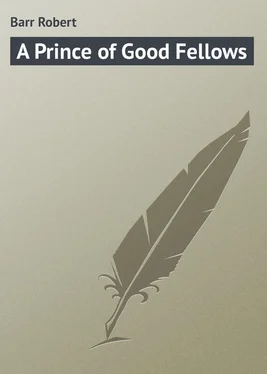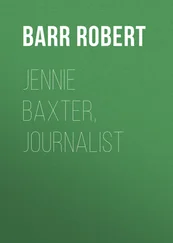Robert Barr - A Prince of Good Fellows
Здесь есть возможность читать онлайн «Robert Barr - A Prince of Good Fellows» — ознакомительный отрывок электронной книги совершенно бесплатно, а после прочтения отрывка купить полную версию. В некоторых случаях можно слушать аудио, скачать через торрент в формате fb2 и присутствует краткое содержание. Жанр: foreign_prose, на английском языке. Описание произведения, (предисловие) а так же отзывы посетителей доступны на портале библиотеки ЛибКат.
- Название:A Prince of Good Fellows
- Автор:
- Жанр:
- Год:неизвестен
- ISBN:нет данных
- Рейтинг книги:4 / 5. Голосов: 1
-
Избранное:Добавить в избранное
- Отзывы:
-
Ваша оценка:
- 80
- 1
- 2
- 3
- 4
- 5
A Prince of Good Fellows: краткое содержание, описание и аннотация
Предлагаем к чтению аннотацию, описание, краткое содержание или предисловие (зависит от того, что написал сам автор книги «A Prince of Good Fellows»). Если вы не нашли необходимую информацию о книге — напишите в комментариях, мы постараемся отыскать её.
A Prince of Good Fellows — читать онлайн ознакомительный отрывок
Ниже представлен текст книги, разбитый по страницам. Система сохранения места последней прочитанной страницы, позволяет с удобством читать онлайн бесплатно книгу «A Prince of Good Fellows», без необходимости каждый раз заново искать на чём Вы остановились. Поставьте закладку, и сможете в любой момент перейти на страницу, на которой закончили чтение.
Интервал:
Закладка:
“If you enter a tiger’s cage you should expect a touch of his claws, so, Lady Catherine, your task is more serious than you anticipated. There is furthermore another source of danger against you, and it is my sincere wish that in the struggle to come you may not be too severely handicapped. While the issue of our contest is still in doubt, your sister will assuredly unlock the door and give the alarm, hoping to prevent your contemplated crime, or my killing of you. I think it right that you should not be called upon to suffer this intervention, for, if you will permit me to say so, I admire your determination as much as I admire, in another way, the Lady Isabel’s leaning towards mercy. I shall then, take this key from the larger door and place it, with your sister, outside on the narrow stairway. You have withdrawn the rope ladder so she cannot alarm the garrison.”
“But I have not withdrawn it,” said Catherine quickly. “My sister must not leave this room or she will bring interference.”
“Then,” said the king calmly, as he rose and took the key from the large door, “we shall at least make it impossible for her to open the way into the hall.” And so saying, he stepped to the smaller door, which he opened, and before either of the women could prevent his action, or even grasp an inkling of his design, he stepped outside, key in hand, and thrust to their places the bolts of the stairway door.
The two girls looked at each other for a moment in silence, Isabel plainly panic-stricken, while in Catherine’s face anger struggled with chagrin. Each was quick to see the sudden consequences of this turning of the tables; the two were helpless prisoners in a remote portion of the castle, no one within its walls being acquainted with their whereabouts. The king, insulted, hoodwinked, and all but murdered, was now at liberty, free to ride the few short leagues that lay between Doune and Stirling, and before daybreak the fortress would be in the hands of an overwhelming force with the present garrison prisoners. In the awed stillness an unexpected sound came to them from the outside; the sound of a man endeavouring to suppress the hearty laughter that overmastered him. To be doomed is bad enough, but to be made the subject of levity was too much for the dauntless Catherine. She flung her dagger ringing to the stone floor with a gesture of rage, then sank upon a bench and gave way to tears; tears of bitter humiliation and rage.
“Ladies,” said the king from the outside, “I beg that you will allow me to open the door.” But, receiving no answer, the bolts were drawn once more; James again entered the apartment and gazed down upon two fair proud heads, crowned with ruddy hair.
“Dear ladies,” said the king, “forgive me my untimely mirth. Both of you take matters much too seriously; a little laughter is necessary in this world. My Lady Catherine, I told you that I could grant no concessions under coercion, but now coercion has vanished and I enter this room a free man of my own will. Tell me, my girl, what is it you want? The rescinding of your father’s exile? It is granted. The right to live unmolested in your own castle? It is granted. Safe conduct to England? It is granted. The privilege of remaining in Doune? It is granted. But do not ask me to rescind banishment against Archibald Douglas, Earl of Angus, for that I shall not concede. The Douglas ambition, and not the Scottish king, has wrecked the Douglas family, both Black and Red. But as far as concerns your own immediate kin, with one exception, I shall give anything you like to ask.”
Catherine rose to her feet, threw back her auburn tresses, and said curtly, —
“We ask nothing but the privilege of leaving the country you rule.”
The king bowed.
“And you, Lady Isabel?”
“I go with my sister and my mother.”
“I grieve at your decision, ladies, and for the first time in my life envy England in getting an advantage over poor old Scotland, which I hope will not be irreparable, for I trust you will return. But if such be your determination, then go in peace, and in the daylight. Your journey shall not be molested by me. But, before you add finality to your intentions, I think it would be but fair to inform your lady mother that the king is anxious to be of service to her, and perhaps she may be content to accept what her daughters are apparently too proud to receive.”
James placed the key once more in the lock, and turning to Catherine said, —
“My fair antagonist, I bid you good-night.”
He stretched out his right hand, and she, with some hesitation and visible reluctance placed her palm in his. Then the king raised to his lips the hand which at one time seemed like to have stricken him.
“And you, sweet Isabel, whose gentle words I shall not soon forget, you will not refuse me your hand?”
“No, your majesty, if you will promise to think kindly of me.”
The king, however, did not raise her hand to his lips, but placing an arm about her waist he drew her towards him and kissed her. Next moment he was hurrying down the stone steps, and the two were left alone together.
The King Investigates
The king, wishing to decide wisely, was troubled by a conflict of evidence, the bane of impartial judges all the world over. A courier from England had brought formal complaint that, while the two countries were ostensibly at peace, the condition along the border was practically a state of war. Raids were continually being made from the southern portion of Scotland across the boundary into England, and the robbers retreated unscathed to hide themselves among their hills, carrying their booty with them. These ruffians had long gone unpunished, and now England made friendly protest in the matter.
The king gathered his nobles about him and laid the case before them. Not a man among them but was older than himself, and therefore more experienced. James requested advice regarding the action it might be thought wise to take. Many of the nobles whose estates lay in the Lowlands of Scotland had themselves suffered from Highland cattle-lifters, and thus they were imbued with a fellow feeling for the raided English across the border. The English protest, they said, was courteously made. The evil was undoubted, and had existed unchecked for years, growing worse rather than better. Henry VIII, who now occupied the English throne, was a strong and determined man, and this continued source of irritation in the northern part of his realm might easily lead to a deplorable war between the two countries. In addition, James of Scotland was nephew to Henry of England, and the expostulation from uncle to nephew was of the mildest, without any threat even intimated.
The nobles thought that James might well put a stop to a state of things which no just man could approve, and thus do an act of justice which would at the same time please an august relative. James admitted that these were powerful arguments, but still if the Border robbers, who had many followers, resisted the Scottish force sent against them, there would be civil war, an outcome not to be looked forward to with light heart.
“In truth,” said the king, “I would rather lead an army against England, with England in the right, than against my own countrymen, even if they were in the wrong.”
This remark seemed to encourage certain gentlemen there present, who up to that moment had not spoken. The Earl of Bothwell, as the highest in rank among the silent phalanx, stepped forward and said, —
“Your majesty, there are always two sides to a question, and, with your permission, I should be glad to put in a word for those Border riders who have been so ruthlessly condemned by men who know nothing of them.”
“It is for the purpose of hearing all there is to say that I called you together,” rejoined the king. “Speak, my Lord of Bothwell.”
Читать дальшеИнтервал:
Закладка:
Похожие книги на «A Prince of Good Fellows»
Представляем Вашему вниманию похожие книги на «A Prince of Good Fellows» списком для выбора. Мы отобрали схожую по названию и смыслу литературу в надежде предоставить читателям больше вариантов отыскать новые, интересные, ещё непрочитанные произведения.
Обсуждение, отзывы о книге «A Prince of Good Fellows» и просто собственные мнения читателей. Оставьте ваши комментарии, напишите, что Вы думаете о произведении, его смысле или главных героях. Укажите что конкретно понравилось, а что нет, и почему Вы так считаете.












